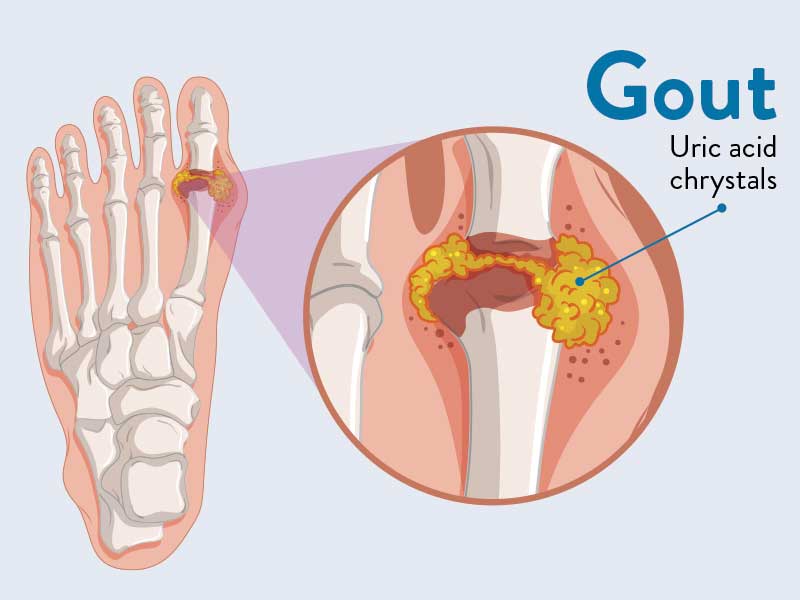Gout is a painful form of arthritis that affects millions of people worldwide. It occurs when uric acid crystals build up in the joints, leading to inflammation, swelling, and intense pain. While the symptoms of gout can be managed with proper treatment, understanding the causes of this condition is crucial for prevention and effective management. In this article, ozinsight will explore the various factors that contribute to the development of gout and how they can be addressed.
What is Gout?
Before delving into the causes of gout, let’s first understand what this condition entails. Gout is a type of arthritis characterized by sudden and severe attacks of joint pain, often affecting the big toe. It occurs when there is an accumulation of uric acid in the blood, leading to the formation of sharp, needle-like crystals in the joints and surrounding tissues. These crystals cause inflammation and intense pain, making mobility difficult during gout flares.
Causes of Gout
Several factors can contribute to the development of gout. Understanding these causes is essential in managing the condition effectively. Let’s explore the most common ones:
High Uric Acid Levels
One of the primary causes of gout is elevated levels of uric acid in the blood, a condition known as hyperuricemia. Uric acid is a waste product that forms when the body breaks down purines, which are naturally occurring substances found in certain foods. When the body produces too much uric acid or fails to eliminate it efficiently, it can lead to the formation of uric acid crystals and the onset of gout.
Diet
Dietary choices play a significant role in the development of gout. Consuming foods rich in purines, such as organ meats, shellfish, red meat, and sugary beverages, can increase the levels of uric acid in the body. Additionally, excessive consumption of alcohol, particularly beer, has been linked to a higher risk of gout. It is important to note that not all individuals who consume purine-rich foods or alcohol will develop gout, but it can trigger gout attacks in those predisposed to the condition.
Genetics
Genetics also play a role in the development of gout. Some people have a genetic predisposition to elevated uric acid levels or decreased ability to eliminate uric acid efficiently, making them more susceptible to gout. If you have a family history of gout, it is important to be mindful of the risk and take preventive measures.
Medical Conditions
Certain medical conditions can increase the risk of developing gout. Conditions such as kidney disease, high blood pressure, diabetes, and metabolic syndrome can disrupt the normal balance of uric acid in the body, leading to higher levels and increased chances of gout.
Medications
Some medications can contribute to the onset of gout or trigger gout attacks. Diuretics, commonly used to treat high blood pressure and edema, can increase uric acid levels by reducing the excretion of uric acid through the kidneys. Additionally, certain cancer drugs and immunosuppressive medications can also raise the risk of developing gout.

Risk Factors for Gout
In addition to the causes mentioned above, several risk factors can increase an individual’s susceptibility to gout. Let’s take a closer look at these factors:
Age and Gender
Gout is more common in men than women, especially between the ages of 40 and 60. However, women’s risk of developing gout increases after menopause, when their uric acid levels start to rise.
Obesity
Obesity is strongly associated with an increased risk of gout. Excess body weight can lead to higher uric acid production and impaired excretion, making obese individuals more prone to developing gout.
Alcohol Consumption
Regular and excessive alcohol consumption, particularly beer and spirits, can raise the risk of gout. Alcohol interferes with the elimination of uric acid from the body and increases its production, contributing to hyperuricemia.
Certain Foods and Beverages
Consuming foods and beverages high in purines can raise uric acid levels and trigger gout attacks in susceptible individuals. Foods like red meat, organ meats, shellfish, and sugary drinks should be consumed in moderation to manage gout effectively.

Lifestyle Factors and Gout
While some causes and risk factors for gout are beyond our control, certain lifestyle modifications can help prevent gout attacks and manage the condition effectively. Consider the following factors:
Diet
Maintaining a healthy diet low in purines and high in fruits, vegetables, whole grains, and low-fat dairy products can help reduce the risk of gout. It is advisable to limit or avoid foods that are high in purines and sugars, as well as excessive alcohol consumption.
Weight Management
Maintaining a healthy weight or losing weight if overweight can significantly reduce the risk of gout. Losing excess weight can help lower uric acid levels and decrease the frequency and severity of gout attacks.
Exercise
Regular physical activity is essential for overall health and can also help manage gout. Exercise helps maintain a healthy weight, improves joint function, and reduces the risk of developing other chronic conditions associated with gout, such as diabetes and high blood pressure.
Hydration
Staying adequately hydrated is crucial for individuals with gout. Drinking plenty of water helps dilute uric acid and promotes its excretion, reducing the risk of crystal formation and gout attacks.
Conclusion
Understanding the causes of gout is vital for individuals who want to prevent or effectively manage this painful condition. While high uric acid levels, diet, genetics, medical conditions, and medications can contribute to gout, adopting a healthy lifestyle, including a balanced diet, weight management, regular exercise, and proper hydration, can help reduce the risk and severity of gout attacks. By taking proactive measures and working closely with healthcare professionals, individuals with gout can experience improved quality of life and reduced pain.
FAQs
Can stress cause gout?
Stress itself doesn’t directly cause gout, but it can trigger gout attacks in individuals who are already predisposed to the condition. Stressful events or prolonged periods of stress can lead to lifestyle changes that may increase the risk of gout, such as poor dietary choices, alcohol consumption, and neglecting self-care habits.
Is gout hereditary?
While gout does have a genetic component, it doesn’t necessarily mean that it will be inherited. Having a family history of gout can increase the risk, but it doesn’t guarantee that an individual will develop the condition. Environmental factors, lifestyle choices, and overall health also play significant roles in the development of gout.
Are there any natural remedies for gout?
While there is no cure for gout, several natural remedies can help manage the symptoms and reduce the frequency of gout attacks. These include staying hydrated, consuming cherries or cherry extract, managing weight, avoiding trigger foods, and practicing stress-reducing techniques like yoga or meditation. It’s important to consult with a healthcare professional before trying any natural remedies.
Can gout be cured completely?
Gout is a chronic condition, and there is currently no known cure. However, with proper management and lifestyle changes, it is possible to control gout symptoms, reduce the frequency of attacks, and prevent long-term joint damage. Treatment usually involves a combination of medications, dietary modifications, and lifestyle adjustments.
Is gout more common in men or women?
Gout is more common in men, especially between the ages of 40 and 60. However, women’s risk of developing gout increases after menopause, when their uric acid levels start to rise. It is important for both men and women to be aware of the risk factors and take preventive measures to manage gout effectively.














Got a Questions?
Find us on Socials or Contact us and we’ll get back to you as soon as possible.